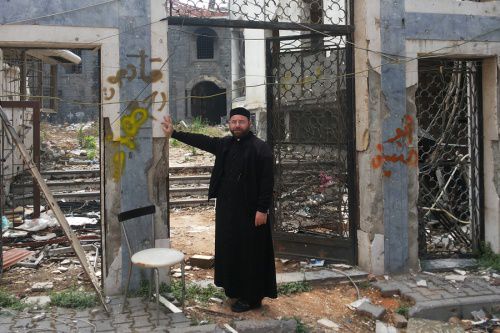Growing unrest in the Middle East is causing great concern for the Christian community around the world, and author George J. Marlin is hoping to enlighten Western Christians on how seriously matters are progressing, as their brethren in the Middle East continue to undergo persecution. His latest book, Christian Persecutions in the Middle East: A 21st Century Tragedy, was published earlier this month by St. Augustine's Press, and details the rise of radical Islamism and its impact on Christians throughout the Middle East. “Western civilization was built on Christianity which, sadly enough, is being forgotten for Western Europe, and even in this nation here,” Marlin told CNA. “I think the Church’s job is to remind the West that its civilization was based on the concept that man is a creature made in the image and likeness of God, and therefore is entitled by his very nature … basic rights, including the freedom to practice one’s religion.” Marlin is chairman of Aid to the Church in Need- USA, a Catholic charity under the guidance of the Pope that supports and aids the persecuted and suffering Church around the world. Last year, Aid to the Church in Need raised $100 million internationally. As chairman, Marlin is given information daily about struggling Christians around the world, particularly in the Middle East. “I’ve been able to see and speak firsthand to bishops and archbishops in the area, and other people who are often persecuted in the area,” Marlin said. Marlin says that for the Christians, their “most daunting task is to survive.” “They’re concerned about survival, they’re concerned about getting three meals a day, they’re hoping they can educate their kids someday. They’re hoping they can come back to their home.” “More importantly, we have to keep in mind that these Christians are beginning to feel abandoned by the Christian world because, although the Pope has come out and made some statements, Cardinal Dolan of New York has made some statements … in the Western media, a lot of this is being ignored,” Marlin stated. The book examines the history of both Christianity and Islam in the Middle East; followed by an in-depth look at eight countries in the region where Christians are particularly persecuted; it then includes perspectives of various experts from the region. “It’s eye-opening for me as I am talking right now to so many other Americans that they’re shocked to learn that there are Christians in the Middle East,” Marlin stated. “So I thought it was important to take this data and put together a story of what exactly is happening in Middle East at this point in time.” He added that Christians can often regard only Europe as historically Christians, and “sometimes forget that the first center [of the Church] was in Antioch, Syria before St Peter moved it to Rome, and so the apostles and early martyrs of the Church were in the Middle East.” Marlin said that it is important for people to realize that even before the Islamic State “came on the scene two years ago,” the 21st century has continually experienced “systemic persecution of Christians.” Marlin’s hope is that the book, as well as the work of Aid to the Church in Need, “jolts the conscience of the West, because too many people in Europe and in the United States have their head in the sand trying to ignore this problem here.” Marlin emphasized that persecution isn't restricted to the brutal, attention-grabbing ways the Islamic State uses to execute its captives. Christians in the Middle East are also persecuted through pressure to convert, employment and education discrimination, church bombings, murder, destruction of homes and businesses, kidnapping, and being treated as second-class citizens. Documents and manuscripts dating back thousands of years have also been destroyed. “We have Christians being driven out, they may never come back,” Marlin stated. “We have the institutional Church being destroyed, and we have the patrimony of the Church being destroyed.” “These same tactics are used in these countries and are profiled in this book,” Marlin said. “It’s going on every day and it has been going on throughout this century and obviously centuries before this. It’s time, I’m hoping, that people begin to catch on, particularly the Christians in the United States.” An example he gave was the Chaldean Archeparchy of Mosul: in 2004, a year after the US invasion of Iraq, it had 20,600 members. By 2013 the number had dropped to 14,100, and last summer, most of the remaining Christians in the city and its environs fled before the Islamic State. In January, its bishop, Amel Nona, was transferred to the Chaldean eparchy for Australia, leaving the Mosul archeparchy vacant, perhaps fated to become a titular see. Marlin suggested that in light of the scale of persecution faced by many Christians in the Middle East, “the President of the United States to appoint a special Middle East envoy just to deal with these Christian persecutions.” He also raised the possibility of economic sanctions, and denying foreign aid to countries who persecute their citizens. He said that the only way groups such as the Islamic State “are going to be put out of business is if modern Islam stands up and says 'this is wrong'. These radical groups, if they are not tamed, if they are not destroyed or eliminated, they may destroy the Christian presence in the Middle East.” Marlin's book concludes with an epilogue and an appendix that provides important documents pertaining to the persecution of Christians, including addresses from Pope Francis, Benedict XVI, and Cardinal Timothy Dolan of New York.

